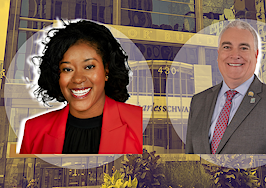In these times, double down — on your skills, on your knowledge, on you. Join us Aug. 8-10 at Inman Connect Las Vegas to lean into the shift and learn from the best. Get your ticket now for the best price.
This post was updated June 13, 2023.
With the ongoing market shift, 2023 has likely been challenging for many agents. It’s clear that sticking to the status quo and expecting favorable outcomes is no longer a viable approach. Embracing change becomes imperative to navigate these turbulent times and emerge successfully on the other side.
To effectively cope with the emerging realities, it will be important to establish behavioral changes in your business practices. Two groups of people will emerge at the end of this shift: Those who knew change had to be made but did little or those who made difficult choices, set specific goals, implemented systems and developed new habits to accomplish their objectives.
There are three fundamental steps in establishing the way forward.
1. Be systematic
A strategic system employed by many agents is the GPS (or 1-3-5). Once a desired outcome is identified, it is broken down into implementable steps.
G = Goal: Once a desired change is identified, a goal is set that identifies that desired outcome. As an example, if you want to see more income from increasing the number of sellers you work with, your goal could be “Close 24 listings in 2023.”
P = Priority: While your goal may be admirable, if that is where you stop, your chances of actually achieving the results you want are most likely somewhere between slim and none. The goal needs to be accompanied by an actionable plan with prescribed activities and benchmarks along the way. The best way to do this is to identify three priorities. As an example, with the goal of 24 closed listings, you could adopt the following:
- Priority No. 1: Set up a targeted plan to reach out to your sphere of influence.
- Priority No. 2: Join a community-based program in the area you wish to service.
- Priority No. 3: Hire a data-driven company such as SmartZip to identify potential listings.
Again, while these might be great priorities, without specific action items, they will probably remain stuck on a piece of paper on your wall.
S = Strategy: these are basic steps you need to undertake to flesh out your priorities into simple activities. If your priority is “Set up a targeted plan to reach out to your sphere of influence,” then your strategies could be as follows:
- Strategy No. 1: By (Date) I will set up a 36-touch program for my SOI.
- Strategy No. 2: By (Date) I will develop or acquire scripts and locate a scripts partner to maximize the effectiveness of my communications.
- Strategy No. 3: By (Date) I will identify and acquire items of value I will give to my SOI.
- Strategy No. 4: I will host 2 seller-targeted open houses every week beginning on (Date) .
- Strategy No. 5: I will ask every pending and closed transaction for referrals beginning on (Date) .
Do the same for each of the three priorities.
2. Be SMART
One of the reasons agents never achieve their goals is the inability to set goals that can actually be achieved. This is where resources such as SMART Goals can help tremendously.
S = Specific: Make your goal as specific and clear as possible. Complicated and lengthy goals are most often not achieved because they are fuzzy or too complicated.
M = Measurable: A goal that states “sell more homes in 2023” is not measurable. Instead, a goal that states “Sell two listings per month in 2023 for a total of 24 homes” is very clear and specific. You can easily, any time during the year, know exactly where you are in relation to achieving your goal.
A = Attainable: So many agents put pie-in-the-sky goals out in the cosmos hoping that they will somehow magically hit them. That is a pure waste of time. Instead, goals should be high enough to cause you to stretch and grow, but not so high as to be impossible.
If an agent is currently doing an average of six transactions a year and sets a goal of doing 60 the following year, they need to understand that they will need significantly more than that number of clients to work with. They must increase their support systems so all those clients get a reasonable level of care and increase their budget to accommodate additional expenses. This could include hiring staff, paying for lead generation programs, increased office space and more.
R = Relevant: Your goals should focus on getting you to your desired outcome. If your overarching purpose is for your business to thrive in 2023, then you need targeted goals that help you trim expenses and increase revenue.
T = Time-based: Goals should have specific timeframes within which you desire to achieve your outcome. As an example, if you know that you need to call 50 people to generate one client and you need five clients to get one closing, then your overarching goal should be to call enough people to generate the number of clients you will need to get the number of closings you desire.
In this example, if you want 24 closed listings, then a simple math equation will provide the number of calls you need to make to homeowners within a specific period of time to achieve your outcome. If you calculate the number of calls you need to make in a year, then you can divide that number into months, weeks and days.
3. Be habitual
At the core of the procrastinator’s universe is the motto, “Why do today what I can put off until tomorrow?” Many of us have worked hard over the years to develop unconscious bad habits and, without a concrete plan to develop good habits, our subconscious routines will systematically undermine our well-intentioned goals. James Clear, in his book Atomic Habits, provides a brilliant outline for replacing bad habits with good.
My goal here is not to give away the methods he specifies for dealing a death knell to bad habits while replacing them with positive behaviors – I recommend you buy the book and put his principles into practice. The bottom line is this: He states that a goal is just the beginning – the ultimate objective is not to just develop goals but to develop systems.
Believing that goals are only short-term solutions, he looks for the long game, stating, “The purpose of setting goals is to win the game. The purpose of systems is to continue playing the game. True long-term thinking is goal-less thinking. It’s not about any single accomplishment. It is about the cycle of endless refinement and continuous improvement. Ultimately, it is your commitment to the process that will determine your progress.”
Goals, while important, focus on short-term results. This helps us understand why some who have a goal of losing weight succeed at reaching their goal but almost immediately gain it all back. Clear clarifies, “Changing our habits is challenging for two reasons: (1) We try to change the wrong thing and (2) We try to change our habits in the wrong way.”
Systems focus on lifelong behaviors that continue to refine, grow and develop so that you can reach your ultimate potential. Simon Sinek echoes these thoughts in his landmark book, The Infinite Game. He explains, “Infinite-minded leaders understand that ‘best’ is not a permanent state. Instead, they strive to be ‘better.’ ‘Better suggests a journey of constant improvement and makes us feel like we are being invited to contribute our talents and energies to make progress in that journey.”
Incremental changes, one action at a time, one day at a time, will add up to behaviors that, when repeated consistently, will deliver the results you want in the year that lies ahead. Refusal to do anything different than you have done to date could make 2023 one of the worst years of your life. It is our hope that by being strategic, being smart and being habitual, you make this your best year yet.
Carl Medford is CEO of The Medford Team.













